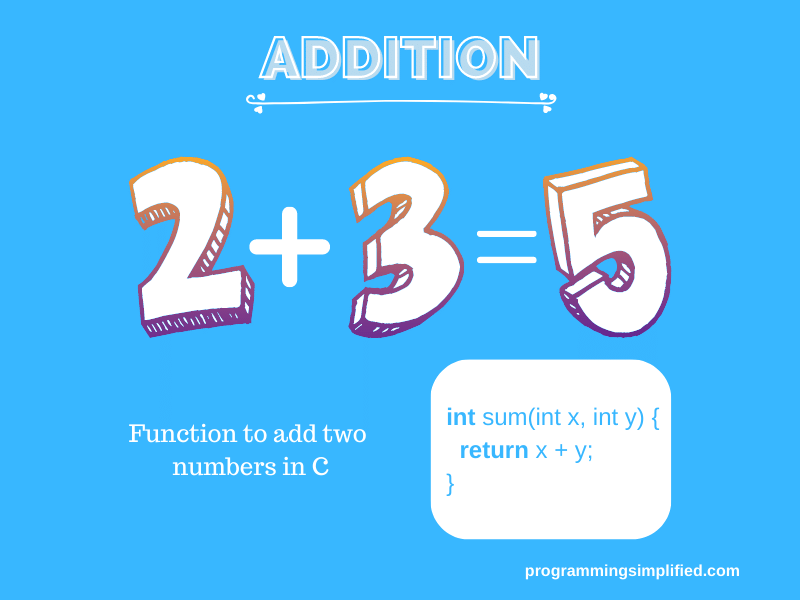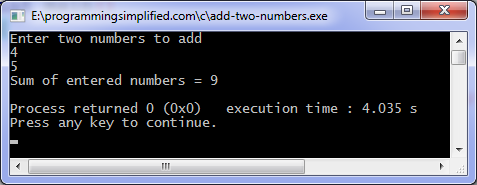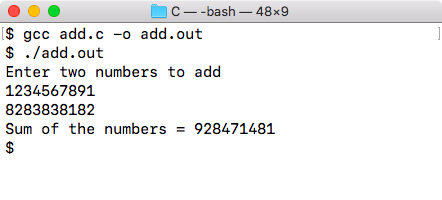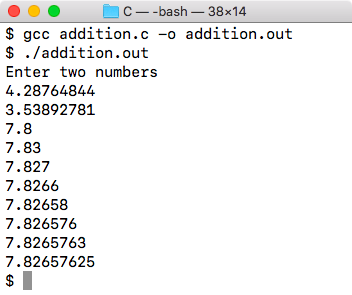
The addition of two numbers in C language is the arithmetic operation of adding them and printing their sum on the screen. For example, if the input is 5 and 6, the output is 11.
Addition program in C
int main()
{
int x, y, z;
printf("Enter two numbers to add\n");
scanf("%d%d", &x, &y);
z = x + y;
printf("Sum of the numbers = %d\n", z);
return 0;
}
Output of the program:
Download Add numbers program.
Similarly, we can write a C program that performs subtraction, multiplication, and division of two numbers.
Overflow in addition
In the expression (z = x + y), integer overflow may occur if the sum is greater than the maximum value that the variable z can store.

Instead of 9518406073 (1234567891 + 8283838182), the result is 928471481 because of the overflow. The maximum value an integer of 4 bytes can hold is 2,147,483,647.
Real numbers addition C program
The program can add only integers. What if you want to add numbers with decimals? To do this, we need to use double data type (you can also use float or long double data types).
int main()
{
double a, b, c;
printf("Enter two numbers\n");
scanf("%lf%lf", &a, &b);
c = a + b;
printf("%lf\n", c);
return 0;
}
Output:
3.21
7.47
10.680000
By default, %lf prints six decimal digits. To print up to two decimal digits, use '%.2lf' in the printf function.
int main()
{
double a, b, c;
printf("Enter two numbers\n");
scanf("%lf%lf", &a, &b);
c = a + b;
printf("%.1lf\n", c);
printf("%.2lf\n", c);
printf("%.3lf\n", c);
printf("%.4lf\n", c);
printf("%.5lf\n", c);
printf("%.6lf\n", c);
printf("%.7lf\n", c);
printf("%.8lf\n", c);
return 0;
}

Sum of two numbers in C
int main()
{
int a = 1, b = 2;
/* Storing result of the addition in variable a */
a = a + b;
printf("Sum of a and b = %d\n", a);
return 0;
}
Doing this isn't recommended because the original value of the variable 'a' is lost; if we require it further in the program, then we will not have it.
C program to add two numbers repeatedly
int main()
{
int a, b, c;
char ch;
while (1) {
printf("Input two integers\n");
scanf("%d%d", &a, &b);
getchar();
c = a + b;
printf("(%d) + (%d) = (%d)\n", a, b, c);
printf("Do you wish to add more numbers (y/n)\n");
scanf("%c", &ch);
if (ch == 'y' || ch == 'Y')
continue;
else
break;
}
return 0;
}
Output of program:
2 6
(2) + (6) = (8)
Do you wish to add more numbers (y/n)
y
Input two integers
2 -6
(2) + (-6) = (-4)
Do you wish to add more numbers (y/n)
y
Input two integers
-5 3
(-5) + (3) = (-2)
Do you wish to add more numbers (y/n)
y
Input two integers
-5 -6
(-5) + (-6) = (-11)
Do you wish to add more numbers (y/n)
n
C program for addition of two numbers using a function
We can calculate sum of two integers using a function.
long addition(long, long);
int main()
{
long first, second, sum;
scanf("%ld%ld", &first, &second);
sum = addition(first, second);
printf("%ld\n", sum);
return 0;
}
long addition(long a, long b)
{
long result;
result = a + b;
return result;
}
We are using the long data type as it can handle large numbers. To add numbers that don't fit in in-built data types, use an array, a string, or other suitable data structure.
C program to add two numbers
Adding a to b (assuming b >= 0) is equivalent to adding one b times to a. For instance, 3 + 5 = 3 + 1 + 1 + 1 + 1 + 1 (adding one five times to 3). Let's implement it through a program.
int main()
{
int x, y, sum, c;
printf("Enter two numbers to add\n");
scanf("%d%d", &x, &y);
sum = x;
for (c = 1; c <= y; c++)
sum = sum + 1;
printf("%d\n", sum);
return 0;
}
